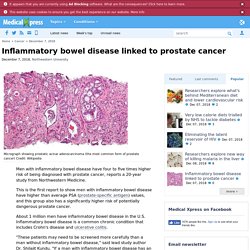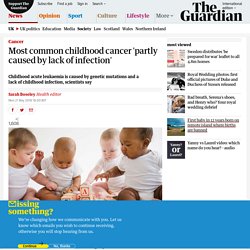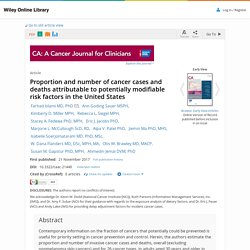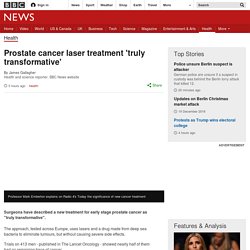

Inflammatory bowel disease linked to prostate cancer. Men with inflammatory bowel disease have four to five times higher risk of being diagnosed with prostate cancer, reports a 20-year study from Northwestern Medicine.

This is the first report to show men with inflammatory bowel disease have higher than average PSA (prostate-specific antigen) values, and this group also has a significantly higher risk of potentially dangerous prostate cancer. About 1 million men have inflammatory bowel disease in the U.S. Inflammatory bowel disease is a common chronic condition that includes Crohn's disease and ulcerative colitis. "These patients may need to be screened more carefully than a man without inflammatory bowel disease," said lead study author Dr. Shilajit Kundu. Kundu is an associate professor of urology at Northwestern University Feinberg School of Medicine and a Northwestern Medicine physician. The study was published in European Urology this week.
Can Eating Organic Food Lower Your Cancer Risk? The authors of that study, known as the Million Women study, said at the time that wealthier, more educated women in the study, who were more likely to purchase organic food, also had risk factors that increase the likelihood of having breast cancer, such as having fewer children and higher alcohol consumption.

The organic food market has been growing in recent years, both in Europe and the United States. Sales of organic food increased to $45.2 billion last year in the United States, according to the Organic Trade Association’s 2018 survey. For food to be certified organic by the Department of Agriculture, produce must be grown without the use of most synthetic fertilizers and pesticides and may not contain genetically modified organisms. Meat must be produced by raising animals fed organic food without the use of hormones or antibiotics. Such items now represent 5.5 percent of all food sold in retail outlets, according to the organic trade group.
Most common childhood cancer 'partly caused by lack of infection' Clean modern homes, antiseptic wipes and the understandable desire to protect small babies against any infection are all part of the cause of the most common form of childhood cancer, a leading expert has concluded after more than 30 years of research.

Childhood acute leukaemia, says the highly respected Prof Mel Greaves, is nothing to do with power lines or nuclear fuel reprocessing stations. Nor is it to do with hot dogs and hamburgers or the Vatican radio mast, as have also been suggested. After the best part of a century of speculation, some of it with little basis in science, Greaves – who recently won the Royal Society’s prestigious Royal Medal – says the cancer is caused by a combination of genetic mutations and a lack of childhood infection. The best news, says Greaves, is that the cancer is likely to be preventable. Proportion and number of cancer cases and deaths attributable to potentially modifiable risk factors in the United States - Islami - 2017 - CA: A Cancer Journal for Clinicians. Introduction Much progress against cancer has been made in the United States over the past several decades, as evidenced by the 25% decline in the cancer mortality rate since 1991.[1] However, the cancer burden remains substantial, with more than 1.6 million newly diagnosed cases and 600,000 deaths estimated to occur in 2017.[1] The costs associated with cancer morbidity and premature mortality are staggering, with approximately $88 to $124 billion per year for direct medical costs alone.[2, 3] Many cancers are causally related to potentially modifiable risk factors,[4, 5] and contemporary estimates of this proportion in a population (ie, the population-attributable fraction [PAF]) are a valuable tool for setting priorities for cancer prevention and control.

Prostate cancer tests are now OK with US panel, with caveats. CHICAGO (AP) — An influential U.S. government advisory panel is dropping its opposition to routine prostate cancer screening in favor of letting men decide for themselves after talking with their doctor.

The new draft guidelines released Tuesday echo those of several leading medical groups, but they don't make the decision any easier for men: With their doctor's help, they have to decide whether to take an imperfect PSA test that has a small chance of detecting a deadly cancer and a larger chance of triggering unneeded worry and treatment with serious side effects. "This isn't a one-size-fits-all" recommendation, said the panel's chair Dr. Kirsten Bibbins-Domingo, a San Francisco internist who already follows the advice and discusses the potential pros and cons with her patients.
Men whose greatest concern is reducing their chances of dying from cancer are sometimes willing to face the consequences and choose testing. The new recommendations come from the U.S. Dr. Prostate cancer laser treatment 'truly transformative' Surgeons have described a new treatment for early stage prostate cancer as "truly transformative".

The approach, tested across Europe, uses lasers and a drug made from deep sea bacteria to eliminate tumours, but without causing severe side effects. Trials on 413 men - published in The Lancet Oncology - showed nearly half of them had no remaining trace of cancer. Lifelong impotence and incontinence are often the price of treating prostate cancer with surgery or radiotherapy. Up to nine-in-10 patients develop erectile problems and up to a fifth struggle to control their bladders. That is why many men with an early stage tumour choose to "wait and see" and have treatment only when it starts growing aggressively. "This changes everything," said Prof Mark Emberton, who tested the technique at University College London. What Does Chemotherapy Actually Do To Your Body?
Type of electromagnetic field therapy improves... Meat and Cancer: The W.H.O. Report and What You Need to Know.